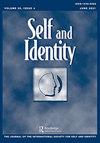Playing to the gallery: investigating the normative explanation of ingroup favoritism by testing the impact of imagined audience
IF 2.1
4区 心理学
Q3 PSYCHOLOGY, SOCIAL
引用次数: 5
Abstract
ABSTRACT The present research examined the role of social norms as a determining source of ingroup favoritism in minimal groups. Across three studies (total N = 814), results showed that ingroup favoritism was reduced when participants imagined the reaction of an external (and egalitarian) entity, as compared to a control condition or a condition in which they were explicitly asked to imagine the reaction of ingroup members. In line with the prediction that the desire to appear as a good group member drives conformity to the ingroup norm, the findings also revealed that favoring the ingroup resulted in higher self-esteem (Study 2). This was however limited to situations where the ingroup norm was inferred or induced to be pro-discriminatory, but not when it was anti-discriminatory (Study 3). The proposed explanation is discussed in the light of dominant explanations of ingroup favoritism.哗众取宠:通过测试想象观众的影响来研究群体内偏袒的规范性解释
摘要本研究考察了社会规范作为最小群体内偏袒的决定性来源的作用。在三项研究中(总共N = 814),结果表明,与控制条件或明确要求参与者想象内部成员的反应的条件相比,当参与者想象外部(和平等)实体的反应时,内部群体的偏袒减少了。研究结果还表明,对内群体的偏爱会导致更高的自尊(研究2)。然而,这仅限于内群体规范被推断或诱导为亲歧视的情况,而不是反歧视的情况(研究3)。根据内群体偏袒的主流解释,讨论了所提出的解释。
本文章由计算机程序翻译,如有差异,请以英文原文为准。
求助全文
约1分钟内获得全文
求助全文
来源期刊

Self and Identity
PSYCHOLOGY, SOCIAL-
CiteScore
5.10
自引率
5.00%
发文量
26
期刊介绍:
Work on self and identity has a special place in the study of human nature, as self-concerns are arguably at the center of individuals" striving for well-being and for making sense of one"s life. Life goals develop and are influenced by one"s view of what one is like, the way one would ideally like to be (or would like to avoid being), as well as one"s perceptions of what is feasible. Furthermore, conceptions of self and the world affect how one"s progress towards these goals is monitored, evaluated, redirected, re-evaluated, and pursued again. Thus, the “self” as a construct has far-reaching implications for behavior, self-esteem, motivation, experience of emotions and the world more broadly, and hence for interpersonal relationships, society, and culture.
 求助内容:
求助内容: 应助结果提醒方式:
应助结果提醒方式:


